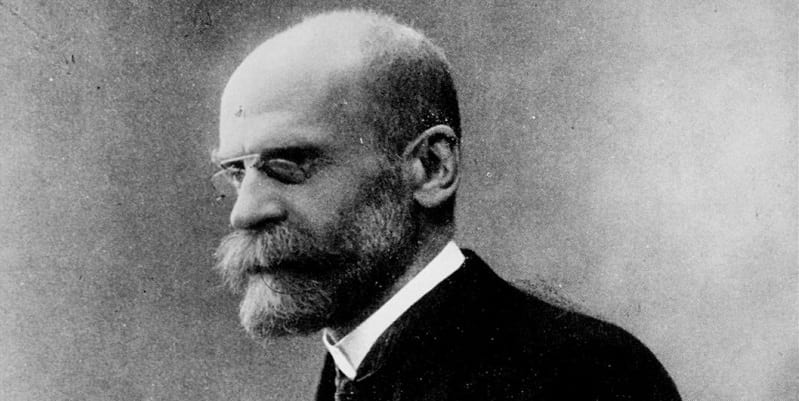Émile Durkheim biography and theory

Émile Durkheim (April 15, 1858 – November 15, 1917) was a well-known French sociologist. He is considered the father of the modern social sciences. Émile Durkheim was officially the founder of the academic discipline of sociology and is often mentioned with other important architects of the social sciences, along with Max Weber and Karl Marx.
Émile Durkheim biography
Youth
David Émile Durkheim was born on April 15, 1858 in Epinal, the capital of the department of Vosges. He was born into a family with a long line of rabbis. Father Moïse had been rabbi of Epinal and chief rabbi of the Vosges for many years.
Mother Mélanie was the daughter of a merchant. Émile seemed destined for the rabbinate, but he later broke with Jewish tradition and produced many secular works and researches, despite his education at a Jewish school.
Despite breaking with the Jewish faith, he remained the product of an Orthodox Jewish family and the Jewish community. This ensured that throughout his life he often faced anti-Semitism from the French bourgeoisie. However, Durkheim found that this hostility caused the Jewish community to become even closer.
Education
Émile did extremely well as a scholar and early student at the Lycée Louis le Grand. He was a good candidate for admission to the renowned and competitive École Normale Supérieure in Paris.
During the time he was taking the entrance exam, he met another very gifted man from the region, Jean Jaurés. He would later lead the French Socialist Party and, like Émile, was very interested in philosophy and social reform in the country. They were both admitted to the École Normale.
At the ENS, they also studied other figures who later proved to have a great influence on the intellectual history and development of France, including Henri Bergson. Durkheim studied there under the guidance of Numa Denis Fuster de Coulanges. His dissertation was on Montesquieu. In his spare time, he read about Herbert Spencer and Augustus Comte, which made him interested in the scientific approach to the world and society.
Émile did not find the humanist programs interesting and shifted his attention to psychology, philosophy, ethics and later to sociology. He finished as one of the last in his 1882 graduating class due to a serious illness.
In 1885, Émile Durkheim decided to leave for Germany. There he studied sociology at the universities of Marburg, Berlin and Leipzig. In 1886, he began working to establish what would later become a new movement within sociology.
Professional career and his contribution to sociology ans theory
The articles Durkheim wrote on the social sciences and philosophy made him popular in France. In 1887 he was appointed by the University of Bordeaux, as Chargé d’un Cours de Science Sociale et de Pédagogie. Here he began to teach his first courses in social sciences.
He introduced the social sciences into the curriculum of schools, thereby reforming the entire French school system. In 1898 he founded L’Année Sociologique, a social science journal. The magazine’s purpose was to publish works by a growing number of students and collaborators within his programs.
In 1897 Durkheim published “Suicide”, a study in which he examined the different suicide rates among Catholics and Protestants. He was one of the first to use quantitative methods to examine the causes and spread of crime.
In 1912, he published “The Elementary Forms of the Religious Life“. In it, he discussed religion as a social phenomenon and attributed the development of religion to the emotional security it provided to society.
The end of Durkheim’s life
Sometime later, World War I broke out. It would have a tragic effect on Émile Durkheim’s life.
His left-wing thinking was patriotic rather than internationalist, in the sense that he sought a secular and rational form of French culture and society. The war and the advent of propaganda made this vision impossible to maintain.
Of the students Durkheim trained, many perished in the trenches. His own son, André Durkheim also died at the front in December of 1915. The loss completely destroyed Émile’s zest for life.
Emotionally exhausted, he collapsed in 1917, hit by a stroke. He died and was buried in the Montparnasse cemetery in Paris.
Émile Durkheim lived to be 59 years old.
Émile Durkheim quotes
- “Melancholy suicide. — This is connected with a general state of extreme depression and exaggerated sadness, causing the patient no longer to realize sanely the bonds which connect him with people and things about him. Pleasures no longer attract.”
- “When mores are sufficient, laws are unnecessary; when mores are insufficient, laws are unenforceable.”
- “Man cannot become attached to higher aims and submit to a rule if he sees nothing above him to which he belongs. To free him from all social pressure is to abandon him to himself and demoralize him.”
- “We do not condemn it because it is a crime, but it is a crime because we condemn it.”
- “Socialism is not a science, a sociology in miniature: it is a cry of pain.”
- “Maniacal suicide. —This is due to hallucinations or delirious conceptions. The patient kills himself to escape from an imaginary danger or disgrace, or to obey a mysterious order from on high, etc.”
- “When this ultimate crisis comes… when there is no way out – that is the very moment when we explode from within and the totally other emerges: the sudden surfacing of a strength, a security of unknown origin, welling up from beyond reason, rational expectation, and hope.”
- “Reality seems valueless by comparison with the dreams of fevered imaginations; reality is therefore abandoned.”
- “One does not advance when one walks toward no goal, or – which is the same thing – when his goal is infinity.”
- “It seems very strange that one must turn back, and be transported to the very beginnings of history, in order to arrive at an understanding of humanity as it is at present.”
- “Irrespective of any external, regulatory force, our capacity for feeling is in itself an insatiable and bottomless abyss.”
- “Crime brings together honest men and concentrates them.”
- “It is society which, fashioning us in its image, fills us with religious, political and moral beliefs that control our actions.”
- “It is said that we do not make the guilty party suffer for the sake of suffering; it is nonetheless true that we find it right that he should suffer.”
- “The most barbarous and the most fantastic rites and the strangest myths translate some human need, some aspect of life, either individual or social.”
- “The totality of beliefs and sentiments common to the average members of a society forms a determinate system with a life of its own. It can be termed the collective or creative consciousness.”
- “…Solidarity is, literally something which the society possesses.”
- “Hence we are the victims of an illusion which leads us to believe we have ourselves produced what has been imposed upon us externally.”
- “Anyone who has truly practiced a religion knows very well that it is [the set of regularly repeated actions that make up the cult] that stimulates the feelings of joy, inner peace, serenity, and enthusiasm that, for the faithful, stand as experimental proof of their beliefs. The cult is not merely a system of signs by which the faith is outwardly expressed; it is the sum total of means by which that faith is created and recreated periodically. Whether the cult consists of physical operations or mental ones, it is always the cult that is efficacious.”
Publications, books and articles by Émile Durkheim
- 2021. Pragmatisme et sociologie. Editions Le Mono.
- 2021. Montesquieu et Rousseau: précurseurs de la sociologie. Editions Le Mono.
- 2020. La sociologie et son domaine scientifique (pp. 13-36). BoD-Books on demand.
- 2018. L’éducation morale: Préface de Serge Paugam. Presses universitaires de France.
- 2017. Les règles de la méthode sociologique. Flammarion.
- 2017. De quelques formes primitives de classification. Contribution à l’étude des représentations collectives. Lectures, Les rééditions.
- 2013. Les formes élémentaires de la vie religieuse: Le système totémique en Australie. Préface de Jean-Paul Willaime. Presses universitaires de France.
- 2002. L’individualisme et les intellectuels (pp. 261-278). Paris: Mille et une nuits.
- 1998. Lettres à Marcel Mauss (p. 410). Paris: Presses universitaires de France.
- 1975. Définition du fait moral. Durkheim, Textes, 2, 257-288.
- 1938. L’évolution pédagogique en France (Vol. 2). F. Alcan.
- 1921. La famille conjugale. Revue Philosophique de la France et de l’Etranger, 91, 1-14.
- 1920. Introduction à la morale. Revue philosophique, 89, 79-97.
- 1916. L’Allemagne au-dessus de tout”: la mentalité allemande et la guerre. na.
- 1915. Qui a voulu la guerre?: les origines de la guerre d’après les documents diplomatiques (Vol. 1). Librairie A. Colin.
- 1901. De quelques formes primitives de classification: contribution à l’étude des représentations collectives. L’Année sociologique (1896/1897-1924/1925), 6, 1-72.
- 1900. Sur le totémisme. L’Année sociologique (1896/1897-1924/1925), 5, 82-121.
- 1897. Essais sur la conception matérialiste de l’histoire.
- 1897. De la définition des phénomènes religieux. L’Année sociologique (1896/1897-1924/1925), 2, 1-28.
- 1896. La prohibition de l’inceste et ses origines. L’Année sociologique (1896/1897-1924/1925), 1, 1-70.
- 1894. Les règles de la méthode sociologique. Revue Philosophique de la France et de l’Étranger, 37, 465-498.
- 1893. De la division du travail social. Ancienne librairie Germer Baillière et cie.
- 1888. Introduction à la sociologie de la famille. In Annales de la Faculté des Lettres de Bordeaux (Vol. 10, pp. 257-281).
- 1888. Cours de science sociale. inLa Science Sociale et l’action, ed. J.-C. Filloux (Paris: Presses Universitaires de France), 77-110.
- 1887. La science positive de la morale en allemagne (suite). Revue philosophique de la France et de l’étranger, 24, 113-142.
- 1886. Les études de science sociale. Revue Philosophique de la France et de l’Étranger, 22, 61-80.
How to cite this article:
Janse, B. (2022). Émile Durkheim. Retrieved [insert date] from Toolshero: https://www.toolshero.com/toolsheroes/emile-durkheim/
Original publication date: 03/15/2022 | Last update: 08/03/2023
Add a link to this page on your website:
<a href=”https://www.toolshero.com/toolsheroes/emile-durkheim/”> Toolshero: Émile Durkheim</a>











